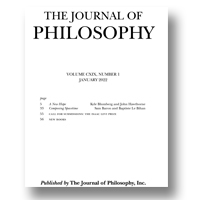|
1.
|
The Journal of Philosophy:
Volume >
119 >
Issue: 8
Sam Roberts
Pluralities as Nothing Over and Above
abstract |
view |
rights & permissions
| cited by
This paper develops an account of pluralities based on the following simple claim: some things are nothing over and above the individual things they comprise. For some, this may seem like a mysterious statement, perhaps even meaningless; for others, like a truism, trivial and inferentially inert. I show that neither reaction is correct: the claim is both tractable and has important consequences for a number of debates in philosophy.
|
|
|
2.
|
The Journal of Philosophy:
Volume >
119 >
Issue: 8
Montgomery Link
The Dispute between Two Accounts of the Continuum
abstract |
view |
rights & permissions
| cited by
The topic of this paper is the debate between two accounts of the continuum. On one account the continuum has discrete elements. On the other it has no discrete elements. Each account has its own strengths and weaknesses. The paper introduces several different explications of continuity before stating and discussing an antinomy and some options to resolve it. An assessment follows in which certain astute philosophical views are vetted. If the dispute concerns the reality of the continuum, there seems to be nothing that could further decide the matter. If the dispute concerns our access to the continuum, there are many adequate options. But, in either case, the dispute is not merely verbal.
|
|
|
3.
|
The Journal of Philosophy:
Volume >
119 >
Issue: 8
Eric Mandelbaum
Everything and More: The Prospects of Whole Brain Emulation
abstract |
view |
rights & permissions
| cited by
Whole Brain Emulation (WBE) has been championed as the most promising, well-defined route to achieving both human-level artificial intelligence and superintelligence. It has even been touted as a viable route to achieving immortality through brain uploading. WBE is not a fringe theory: the doctrine of Computationalism in philosophy of mind lends credence to the in-principle feasibility of the idea, and the standing of the Human Connectome Project makes it appear to be feasible in practice. Computationalism is a popular, independently plausible theory, and Connectomics a well-funded empirical research program, so optimism about WBE is understandable. However, this optimism may be misplaced. This article argues that WBE is, at best, no more compelling than any of the other far-flung routes to achieving superintelligence. Similarly skeptical conclusions are found regarding immortality. The essay concludes with some positive considerations in favor of the Biological Theory of consciousness, as well as morals about the limits of Computationalism in both artificial intelligence and the philosophy of mind more generally.
|
|
